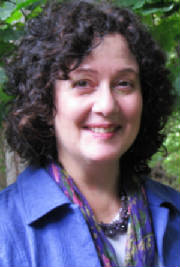|

It was a rainy afternoon in late November when Sarah,* huddled under an
umbrella, trudged up the stone steps to her
Rector's study, next door to the
parish office. Closing her umbrella, she sat down in the chair across from
his desk,
and burst into tears. "I really appreciate you making time to meet
with me," she said, sobbing. "I just don't feel close
to God anymore."
The Rector was startled. In the few months since his arrival in the
parish, he'd already come to appreciate Sarah
as a popular church leader who
taught Sunday school, helped out with a thriving outreach ministry, and led a
weekly
Bible study group whose members relished her sense of humor. "What's
going on, Sarah?" he asked gently.
"I just don't feel close to God anymore." Still sobbing, Sarah pulled a
crumpled tissue out of her purse. "I
don't know what God wants from me.
Everything's a mess."
"A mess?" The Rector was puzzled and concerned. He knew Sarah had two
adorable preschoolers, and her husband,
Bill, appeared to be fond of her. She
did look a little tired, but in his experience that wasn't unusual among
young
mothers.
"Well, not really a mess." Sarah blew her nose. "I mean, things at home
are okay. Bill's a great guy, and I love
spending time with the kids." She
smiled, eyes brimming. "I just feel so far from God..." Sarah's voice trailed
off
to a whisper. "Maybe I'm just not praying right."
The Rector walked over to his bookcase and pulled out a thin paperback.
"This is one of my favorite books on
prayer," he said kindly. "Why don't you
borrow it and see if it helps. Then we can talk again if you'd like." Hearing
a knock on the door, he glanced at his watch. "Sarah, I promised to join the
Buildings and Grounds meeting in the
parish office, and it sounds like
they're getting impatient. Why don't you and I pray together before you go?"
Sarah
wiped her eyes, they bowed their heads, and the Rector prayed
aloud. Then he escorted her to the door and handed her umbrella.
"I'll pray
for you, Sarah. Give my best to Bill."
Sarah brought the book home and put it on her nightstand, but she never
managed to get past the first page. Three
tearful months later she located a
pastoral psychotherapist in her area and called for an appointment. The
pastoral
psychotherapist diagnosed her with depression.
 When are counseling sessions with a priest not enough?
When life hurts and your relationship
to God seems to be part of the
problem, it's not always easy to know where to turn. "Usually you can tell if
somebody has a fairly specific situation that they want to work through and
if the concern seems very situational,
you can sort through the dynamics,"
said the Rev. Steve Yagerman, Rector of All Saints', Manhattan. "Sometimes
you can help somebody -- in a single session or a couple of sessions -- in a
really profound way to gain some
insight into their situation."
At other times, though, a few counseling sessions with a parish priest
are not enough. In fact, Diocesan guidelines call for a maximum of six
sessions between priest and parishioner.
"This is not engraved in stone. It's
just meant to remind priests that a seminary education does not qualify
them
to do psychotherapy with people," said the Rev. Canon Anne Richards, diocesan
Executive for Ministry
Development.
"I don't want to underestimate the role of the parish priest in the
psychological
lives of the people he or she serves, because one of the
foundational understandings of Christianity is that spirit
and psyche are
really united," she continued. "A parish priest, by what he or she says or
models, even
briefly, may have a profoundly helpful effect on a person's
psychological well-being. But the job of actual, intentional,
psychotherapeutic treatment remains the domain of the pastoral
psychotherapist (or secular psychotherapist)."
"I know intuitively when I'm out of my league"
Fortunately,
many clergy will quickly recognize that they are not
prepared to cope with a particular problem. "I know intuitively
when I'm out
of my league," said the Rev. Carole Johannsen, Rector of St. Luke's, Katonah.
"When
it comes to having to change the patterns or look for deeply buried
patterns, or if it's something that clearly
needs ongoing care, I'm not
trained for that."
Fortunately, many clergy will quickly recognize
that they are not prepared to cope with a particular problem. "I know intuitively when I'm out of my
league," said the Rev. Carole Johannsen, Rector of St. Luke's, Katonah. "When it comes to having to change
the patterns or look for deeply buried patterns, or if it's something that clearly needs ongoing care, I'm not
trained for that."
The limitations on parish clergy's ability to do individual counseling
derive not only from the nature
of their training, but from the nature of
their vocation. "The role of a parish priest is to build up a community of
faith
by being a preacher, teacher, and giver of spiritual counsel," said
Canon Richards. "Spiritual counsel, however,
does not mean therapy.
It means that helpful conversations between a priest and a parishioner about 'issues' in the parishioner's
life are those that nurture the person's relationship with God and his/her spiritual life. It's like a process of theological
reflection
-- helping the person to see how God is working in his or her life. It's not
to give therapeutic advice
on family matters or make 'psychotherapeutic'
observations," Richards explains.
Often parishioners are surprised to hear this. "It's very easy for
priests to fall into the 'therapist'-type role
since our culture is so
therapy-inclined and people sometimes think that's what priests are supposed
to do -- give
advice on family matters, understand them completely, and so
forth," said Richards. When that happens, "the spiritual
side of people's
inner lives can be ignored. Priests miss a wonderful and powerful opportunity
to help people connect
with God more strongly if they allow themselves to
slip into the role of pseudo-therapist and forget that as priests they
have a
symbolic role as a bridge to the divine."
Pastoral psychotherapy and parish-based pastoral care don't mesh "There are a lot of things that we can do as clergy
to provide counsel, guidance, and even have a therapeutic effect," agreed the Rev. Dr. Hillary Bercovici, Rector of
St. Mary's, Scarborough, "but there are also a lot of things we can't do and really shouldn't do."
"If a person comes in and says, 'You know, what I'd really like to do
is meet with you over several weeks and
talk about the meaning of things that
are going on in my life,' that's absolutely valid, but because of my other
responsibilities
I just can't provide that level of intensity," he continues.
"Pastoral psychotherapy is a narrow focus and discipline
that requires a
particular context and setting to be effective. It is a kind of pastoral
care, but very intense. It
is so focused. Parish-based pastoral care is a
broader, more wide-ranging ministry that involves everything from life
transitions, baptisms, marriage, birth, and social contact throughout the
week. The two contexts just don't mesh."
Unlike the priest-parishioner relationship, which takes place in the
context of everyday life, the pastoral psychotherapist's
consulting room is a
place apart. Here the client has both the freedom and boundaries to explore
feelings and experiences.
Sometimes it can be upsetting when a priest suggests that it might be
helpful to consult a therapist. Parishioners
may worry, "Does he or she think
I can't cope? Or that I'm crazy?" Actually, seeking therapy is an act of
courage
and faith, an indication that a person is willing to open up to
healing.
"It's a sign of strength to acknowledge that we all need help and
guidance at times," said the Rev. Steve Yagerman.
"If I think the person is
mature enough to hear it, I would share the fact that I've been in therapy
and found it
helpful, as have many of the people I respect the most."
"Having been in therapy after my husband died, I can say from
my own
experience that it's helpful," echoed the Rev. Carole Johannsen.
"I'm not making a referral to a pastoral psychotherapist
because
there's anything wrong with the person, but encouraging them to avail
themselves of some deeply helpful resources
within the Body of Christ," said
the Rev. Dr. Hillary Bercovici. "It's a matter of doing the next right thing,
of
deepening what the two of us have been able to begin."
If the transition from parish care to psychotherapy is to be a positive
one, it's important to be discerning
in choosing a mental health
practitioner. Members of the American Association of Pastoral Counselors are
certified
mental health professionals with advanced training in theology and
spirituality They are committed to seeking creative
and respectful ways of
bringing a client's own spirituality into the healing process.
Pastoral psychotherapists do therapy in a religious context
"Pastoral psychotherapists are people who do therapy with people within
a religious context," said Canon Richards.
"In other words, they understand
the life of the psyche and also the life of faith, so that a practicing
Christian
could talk with them about psychological problems knowing that they
also understand their religious beliefs and see the
connection between the
two."
"I would encourage people to ask up front, during the initial
consultation, 'When we deal with matters of faith,
how well versed are you?'"
recommended Bercovici. "I ask the specific religious background of my
therapist, just as
I ask about credentials: 'What tradition were you raised
in and where are you right now?'"
It's less important that the therapist's religious convictions and
affiliation precisely match your own than
that she or he respect your faith
and help incorporate it in the healing process.
"What I'm looking for is somebody who is not hostile to the faith,
somebody who wouldn't say, 'Oh, this belief
is simply a symptom of the deeper
unresolved unconscious issue with your mother,'" said Bercovici. "To say that
is
only to do violence to the claim that a person's faith is real and
genuine."
The priest is still your pastor
If your priest suggests that psychotherapy might be helpful, keep in
mind that she or he is still your pastor.
Many clergy welcome feedback from
parishioners they've referred to a psychotherapist. And in the months and
years
to come they are still available to offer spiritual support.
"I listen to their story and we encase it in prayer. I stay
in touch
with them and they know I pray for them," said the Rev. Carole Johannsen. "I
remind them, 'Christ is walking
with you and lots of people love you.'
Starting therapy is a good, healthy decision that will move you toward
strength
and healing."
*Name and details have been changed to protect confidentiality.
|

